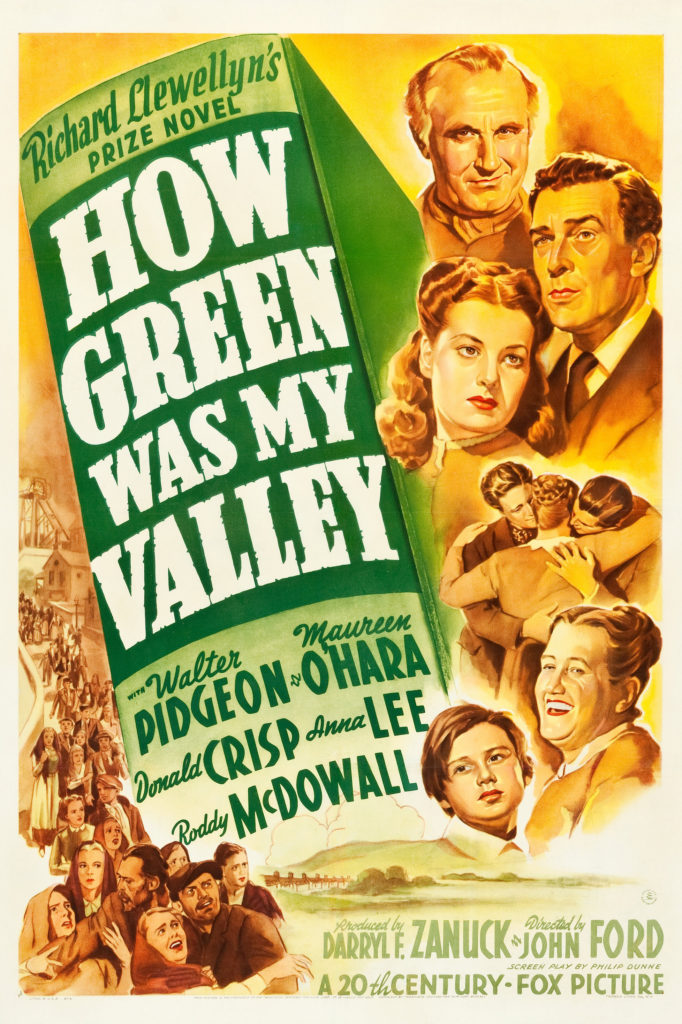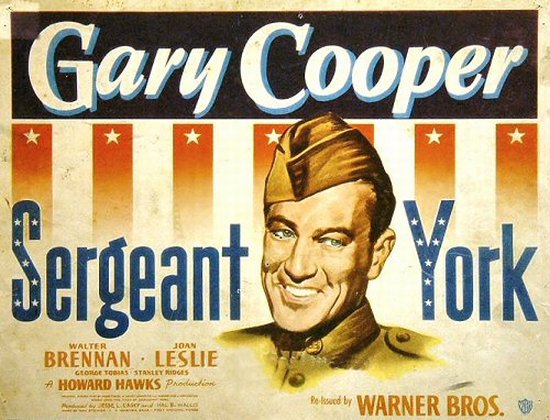1941
In the end of Lin-Manuel Miranda’s Hamilton, Aaron Burr laments that despite all his accomplishments, his hopes and dreams, his only legacy to history is being the man who shot Alexander Hamilton. His entire existence is boiled down to being the villain in someone else’s story.
With that in mind…
And The Oscar Goes To:
A lot of people worked on How Green Was My Valley, and presumably worked hard. Sets were built, actors worked to develop their characters, cinematographers tried to get just the right shot. There was probably great pride running through the cast and crew at the premiere. All to be remembered as the movie that stole the Oscar from Citizen Kane.
Which maybe isn’t fair, but… it definitely didn’t deserve the trophy. I’ve only seen four of the nominees, but I still rank this one third at best.
A man, about to leave his town for the last time, remembers how good it was when he was a small child… and then spends two hours walking us through all the ways his valley stopped being green. His brothers were demonized for forming a union; the mine basically fired people at will; his sister fell in love with the town preacher, but when he wouldn’t condemn her to poverty by marrying her, she instantly married the mine owner’s son even though she was visibly miserable at her own wedding; her maid later spreads rumours about her to shame the whole family; and two family members die in the mine that this kid abandons higher learning to work in for some reason I don’t respect.
And of all the things that happen to this family (whose aggressively Welsh names I did not bother to learn), the only one that happens to the narrator is his rough start at his fancy school. He has a cruel teacher and gets bullied on his first day. The menfolk of the family get him boxing lessons to deal with the bully, but that just leads to the teacher beating him unconscious with a cane for fighting. And while the grown brothers respect the kid’s wishes and don’t seek reprisal, thankfully his boxing instructor feels less bound by this, and in the movie’s best scene “instructs” the abusive teacher in the ways of the Marquis of Queensbury. Damn near “instructs” him into a coma. It was delightful.
This is my third “A family lives through turmoil as the years start coming and they don’t stop coming” movie, where there isn’t so much a plot as a series of events. This one has the shortest timeline as the kid never visibly ages, but… Look, I said I was gonna stop bringing him up all the time but once you’ve seen one of these movies underscored by the ludicrously noble antics of Yancey Cravat, the ones without him feel hollow. Beyond that… the acting is not on par with Citizen Kane, other than Maureen O’Hara as the sister and Walter Pidgeon as the preacher she loves, The Least Welsh Man in Wales. Several of the cast are much closer to Tommy Wiseau than Orson Welles.
We’re supposed to be seeing how the kid’s Valley got less Green, but the seeds of their destruction were sewn from the beginning. No town whose entire economy and identity is based on one mine, mill, or factory has a happy ending.
Here’s a Twitter thread.
I suppose it is interesting to learn that “The plight of the UK coal miner” genre didn’t begin with Margaret Thatcher. Well, there’s only one thing to be done. New feature! Let’s find us a greener valley somewhere in the 1940s!
How Green Was Their Valley? Honestly even before the Bad Things start to happen it was still an entire town that lived or died on the whims of a mine owner, so… only kinda green. Somewhere betwixt lime green and lemon yellow.
And Rotten Tomatoes Says: They’re kinder to the performances than I was, placing it at 57/93. Feels high.
The Box Office Champ
I mean one could argue that the top grossing picture of 1941 was still Gone With the Wind, because it was still out there pulling in crowds, but I’m sticking to “top grosser in its first calendar year of release,” because a lot of massive hits come out around Christmas and stay at the top of the box office at least through January. So with that in mind…
Oh, it’s… another World War 1 movie. [Glances at Europe, 1941] Kinda… kinda thought we’d be done with WW1 by now. But hey, it’s Gary Cooper! Haven’t seen him since Wings, when he scoffed at lucky charms then immediately crashed his plane. So… where’s our head at vis-à-vis war, Hollywood?
Alvin York is a hard drinkin’ hooligan in the ruralist of rural Tennessee. He meets a nice lady, and tries to get his act together to win her over, which he does and does, then finds religion after getting struck by lightning, and you’re nearly an hour into this movie and wondering why it’s called Sergeant York.
Well, after 95 minutes of “Alvin York sure was swell,” he finally accepts that fighting for his country maybe CAN be reconciled with his new faith, goes to Europe, and manages to single-handedly take out an entire machine gun nest, taking over 130 prisoners with just seven troops.
So, that answers my question. In July of 1941, Hollywood released a Great Man Biopic [groan, roll eyes] to show what a hero you can be fighting Germans for your country. Priming the pumps, as it were. Shame it moved so damn slow. He’s “Sergeant York” for about eleven minutes at the end.
Gary Cooper does well in the title role save for one thing: his simple southern-boy Huckleberry Finn Tennessee dialect sounds about as natural and believable as Dick Van Dyke’s cockney accent in Mary Poppins. Which is to say, it’s not good.
Here’s some Twitter thoughts where I complain that an hour and a quarter of simple life in Tennessee was not what I signed up for.
How Green Was Their Valley? Call me a coastal elitist if you’d like (I’m a 12 hour drive from any ocean), but I’m not swayed by Appalachian Poverty Porn, so I’d say his Valley was never overly Green.
And Rotten Tomatoes Says: 88% from the reviewers, 87% from audiences, I don’t know, maybe you have to take a film as it is, rather than what the marketing… and title… tell you it is.
Other Events in Film
- Well, Citizen Kane, obviously. A true masterpiece, innovative in its camerawork, that had the misfortune to make a powerful enemy who tried to crush it. There are probably 1000 film blogs and YouTubes that can explain why Citizen Kane is great if you need that. And, well, 400 saying it’s overrated, some people just gotta be wrong about things.
- Speaking of masterpieces, The Maltese Falcon also came out this year. I’d probably need a spinoff blog series to discuss all the classic Humphrey Bogart movies that fell short at the box office or Oscars.
- Disney released Dumbo, which has its strengths and weaknesses looking back but also shows Disney wasn’t yet finding feature-length stories, ’cause Dumbo is barely over an hour.
- You know what might have been nice after the disappointing Boom Town is getting to cover The Philadelphia Story with Cary Grant, Katherine Hepburn, and James Stewart, but no, y’all Silent Generation chumps saw Sergeant York.
Next Page: On to the next war



One thought on “Art Vs Commerce: How Green Was the Golden Age? (1940s)”